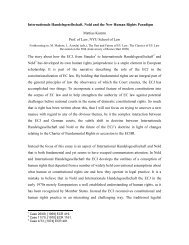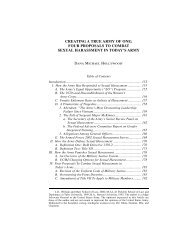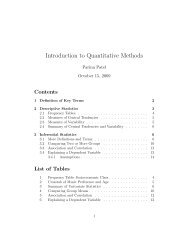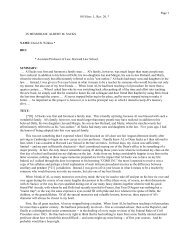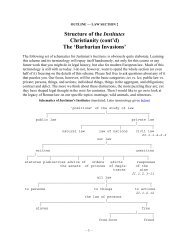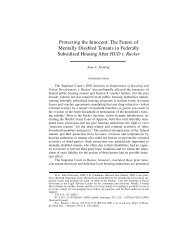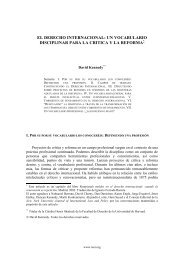Patients as Consumers - Harvard Law School
Patients as Consumers - Harvard Law School
Patients as Consumers - Harvard Law School
Create successful ePaper yourself
Turn your PDF publications into a flip-book with our unique Google optimized e-Paper software.
MLR 106-4 Edit Format Document Hall Mich L Rev.doc<br />
administrative agencies generally do this work, but no such agency<br />
protects patients. 234 Consequently, <strong>as</strong> the Supreme Court said of public<br />
utilities in 1876, “in matters which do affect the public interest<br />
. . . courts must determine what is re<strong>as</strong>onable.” 235 Amen.<br />
5. Determining Re<strong>as</strong>onable Rates<br />
Our winding path through the supervisory doctrines suggests<br />
several possibilities for holding providers to justifiable prices. But<br />
how should courts evaluate the re<strong>as</strong>onableness of medical fees? Again,<br />
the short answer is that courts have doctrines at hand which can be<br />
fitted to the t<strong>as</strong>k in the usual common-law way. Certainly, determining<br />
re<strong>as</strong>onableness is well within judicial experience and competence.<br />
Valuation is a perv<strong>as</strong>ive judicial function; tort and contract c<strong>as</strong>es<br />
routinely present damage issues quite <strong>as</strong> challenging. 236 Nor are these<br />
valuation problems unduly dependent on elusive legislative, social, or<br />
“polycentric” facts. 237<br />
Moreover, several elements of doctors’ legal obligations echo the law of<br />
public callings. See supra notes 146–149 and accompanying text.<br />
234. Some states once regulated hospitals like public utilities, but<br />
now only Maryland does. See Anderson, All-payer Rate Setting, supra note 117,<br />
at 35–36.<br />
235. Munn v. Illinois, 94 U.S. 113, 134 (1876). Another Supreme Court<br />
c<strong>as</strong>e echoed this sentiment:<br />
[I]t h<strong>as</strong> always been recognized that, if a carrier attempted to<br />
charge a shipper an unre<strong>as</strong>onable sum, the courts had jurisdiction<br />
to inquire into that matter and to award to the shipper any<br />
amount exacted from him in excess of a re<strong>as</strong>onable rate; and also<br />
in a reverse c<strong>as</strong>e to render judgment in favor of the carrier for<br />
the amount found to be a re<strong>as</strong>onable charge. . . . There is<br />
nothing new or strange in this. It h<strong>as</strong> always been a part of the<br />
judicial function . . . .<br />
Reagan v. Farmers’ Loan & Trust Co., 154 U.S. 362, 397, 399 (1894); see<br />
generally Wyman, supra note 233, at 1232.<br />
236. Indeed, courts routinely determine the re<strong>as</strong>onableness of medical<br />
expenses in calculating damages in personal injury suits. John Dewar<br />
Gleissner, Proving Medical Expenses: Time for a Change, 28 Am. J. Trial<br />
Advoc. 649, 649 (2005) (“Current legal procedures and practices . . . in tort<br />
c<strong>as</strong>es typically involve obtaining testimony from treating physicians<br />
concerning the necessity and re<strong>as</strong>onableness of healthcare charges.”); see<br />
generally L.C. Di St<strong>as</strong>i, Jr., Annotation, Necessity and Sufficiency, in<br />
Personal Injury or Death Action, of Evidence <strong>as</strong> to Re<strong>as</strong>onableness of Amount<br />
Charged or Paid for Accrued Medical, Nursing, or Hospital Expenses, 12 A.L.R.<br />
3d 1347 (1967).<br />
237. Nation, supra note 9, at 135–36 (rejecting courts’ concern over<br />
regulating prices because they can refer to the average that a hospital<br />
receives from insurers <strong>as</strong> an objective, market-determined price); cf. Lon L.<br />
Fuller, The Forms and Limits of Adjudication, 92 Harv. L. Rev. 353, 394<br />
U of M <strong>Law</strong> <strong>School</strong> Publications Center, November 2, 2007, 12:51 PM<br />
Page 48




